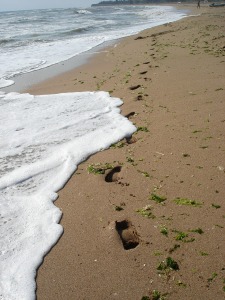Most of us know or have an idea of what sustainability means theoretically, but do we always practice sustainability in our daily lifestyle? It just takes a few adjustments in our day to make a shift towards sustainability and reduce our ecological footprints on the globe. We will discuss here what we mean by ecological footprint, and acting responsibly in our daily lives to progress towards a sustainable future. We cannot blame the government or corporations, when corporations and government organizations are here to serve individuals. There is a whole lot we can do to influence how we are governed or how corporations operate. Our future is designed, equipped and governed by the ideas of every one of us, and empowered by the choices that we make in our everyday lives and through our lifestyles.
What is ecological footprint?
 We, the humans, are biological beings, and part of the ecology on earth. We’ve been using resources from the earth to live, grow, and expand our civilizations. Every individual and community on earth, from the beginning of time, have been consuming resources from the earth in order to grow. Ecological footprint simply means the impact of human activities on the globe and the amount of resources necessary to produce the goods and services necessary to support a particular lifestyle, in terms of the area of biologically productive land and water. It also measures how much resources are needed to produce what we need, and what we consume and dispose of.
We, the humans, are biological beings, and part of the ecology on earth. We’ve been using resources from the earth to live, grow, and expand our civilizations. Every individual and community on earth, from the beginning of time, have been consuming resources from the earth in order to grow. Ecological footprint simply means the impact of human activities on the globe and the amount of resources necessary to produce the goods and services necessary to support a particular lifestyle, in terms of the area of biologically productive land and water. It also measures how much resources are needed to produce what we need, and what we consume and dispose of.
Sustainable Measures has shown that the amount of productive land used by Americans doubled between 1900 to 1950 and doubled again between 1950 and 1995. This is due to the improvements in economy and quality of life that many Americans enjoy. With every development in science and technology, we needed more resources. The modern facilities that we enjoy, such as central heating, indoor plumbing, automobiles, telephones, and electric light bulbs, all increased the amount of productive land and resource a person needs, along with the improvements in the quality of life.
Everything we do in our everyday life has consequences. Some impact our immediate future, and some have long lasting effect on our environment and nature. Everyone has a footprint on ecology by the way they live. Every one of us has an ecological footprint. There is an interesting quiz setup at myfootprint.org , where you can find out what your impacts on ecology is.
How ecological footprints impact the globe
 Think of your daily life. You might drive to work, watch TV, or do your laundry. Each one of these activities comes with a price tag that cannot be measured just in terms of money. We are using natural resources and negatively impacting ecology, with each of these tasks. By adding up all the resources that we use, we can calculate our footprint on the planet. Things that we use and extract from the earth, as well as things that we add to the environment, add up and account for our ecological footprint. We can calculate the human footprint on the planet by measuring how much earth’s natural resources we are using.
Think of your daily life. You might drive to work, watch TV, or do your laundry. Each one of these activities comes with a price tag that cannot be measured just in terms of money. We are using natural resources and negatively impacting ecology, with each of these tasks. By adding up all the resources that we use, we can calculate our footprint on the planet. Things that we use and extract from the earth, as well as things that we add to the environment, add up and account for our ecological footprint. We can calculate the human footprint on the planet by measuring how much earth’s natural resources we are using.
The six categories of withdrawals
- Carbon: A measure of carbon emissions, represented by the amount of forest land that would be needed to sequester carbon dioxide emissions, not including the fraction that is absorbed by the oceans and leads to acidification.
- Cropland:The amount of cropland used to grow plants for food, fiber, animal feed, and commodities including oil, soy and rubber.
- Grazing land:The amount of grazing land used for raising animals for meat, wool, dairy, hide, and livestock.
- Forests: The extent at which forests are cut down for lumber, pulp, and fuel.
- Fishing grounds: The estimated primary production required to support the fish and seafood caught in freshwater and marine environments.
- Built-up land:The amount of land used for human civilizations, structures, and developments. (WWF)
How do we achieve a sustainable lifestyle?
 Generally we can reduce our negative impact on the globe by reducing our consumption of resources and reducing pollution. Using resources that can be quickly regenerated is a way to achieve sustainability. The resources may be environmental, economical, or social. To achieve sustainability, we need both sustainable technology, and also need to make sustainable choices. (Institution of Mechanical Engineers)
Generally we can reduce our negative impact on the globe by reducing our consumption of resources and reducing pollution. Using resources that can be quickly regenerated is a way to achieve sustainability. The resources may be environmental, economical, or social. To achieve sustainability, we need both sustainable technology, and also need to make sustainable choices. (Institution of Mechanical Engineers)
Every human produces an individual ecological footprint that is determined largely by the wealth and level of development in the country they live in. The more developed a country is, the bigger ecological footprint it’s going have. However, the choices we make in our daily lives can also make a big difference. Our daily activities, such as driving car, washing clothes, watching TV, or running a factory, can all add up to a large ecological footprint. The challenge of reducing our ecological footprint keeps growing and getting bigger every day.
Can we use our resources at this rate and still expect to create a future for us? Will we be able to support our future generations with the diminishing resources and a contaminated globe in the future? These are some big questions that we need to ask ourselves and start thinking about.
P.S: We’d love to hear your thoughts on this topic. Please add your comments in the comment box below and don’t forget to share.
Source: Institute of Ecolonomics




Maybe it is time to reduce our impact to environment? How about these steps to reduce our ecological footprints: https://azgreenmagazine.com/ecological-footprints/